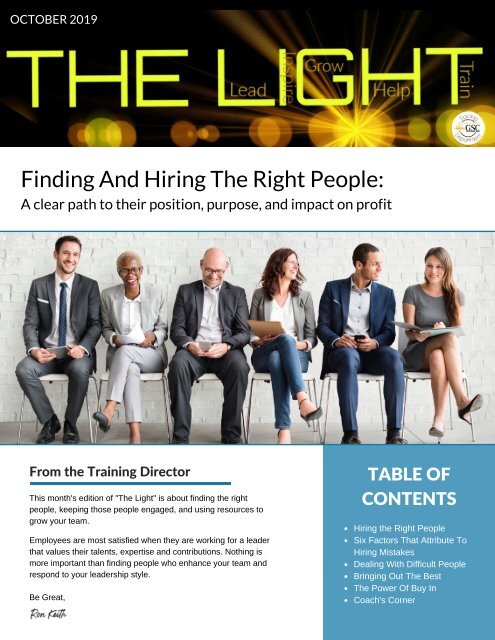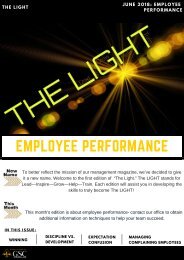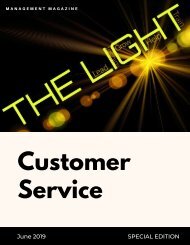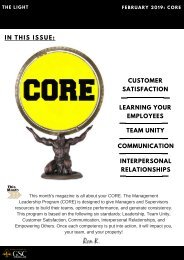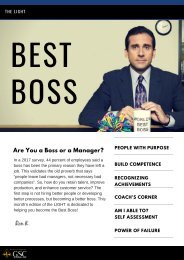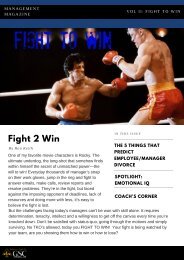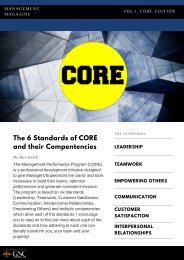Magazine_ October 2019
Finding and Hiring the Right People
Finding and Hiring the Right People
Create successful ePaper yourself
Turn your PDF publications into a flip-book with our unique Google optimized e-Paper software.
OCTOBER <strong>2019</strong><br />
Finding And Hiring The Right People:<br />
A clear path to their position, purpose, and impact on profit<br />
From the Training Director<br />
This month's edition of "The Light" is about finding the right<br />
people, keeping those people engaged, and using resources to<br />
grow your team.<br />
Employees are most satisfied when they are working for a leader<br />
that values their talents, expertise and contributions. Nothing is<br />
more important than finding people who enhance your team and<br />
respond to your leadership style.<br />
Be Great,<br />
TABLE OF<br />
CONTENTS<br />
Hiring the Right People<br />
Six Factors That Attribute To<br />
Hiring Mistakes<br />
Dealing With Difficult People<br />
Bringing Out The Best<br />
The Power Of Buy In<br />
Coach's Corner
Don't accept "yeah I've done that" or yes and no<br />
answers. Open ended questions allow the candidate<br />
to show the how and why of their performance: "Tell<br />
me about a time when you..." or "Tell me about the<br />
last time you changed out a..."<br />
HIRING THE RIGHT<br />
PEOPLE<br />
From your Human Resources Director<br />
1. Ask Your Questions and Be Quiet<br />
A common mistake for a manager is to begin<br />
their questions with an elaborate story or<br />
explanation.This inevitably leads the<br />
candidate to the answer you are looking for.<br />
Instead ask your question and allow the<br />
candidate to do the talking. Eight seconds of<br />
silence will speak volumes about that person<br />
rather than the eight minutes you are<br />
speaking.<br />
3. Listen and Observe<br />
Listening to the candidate is very important, but also<br />
watch how they react. Looking down and to the left<br />
is a common sign that someone is not being truthful.<br />
Looking around a lot shows you that the candidate<br />
has trouble focusing. Do they act in a manner you<br />
want them to act with a resident? How they treat you<br />
in the interview is likely the best way they will treat a<br />
resident.<br />
4. Genuine: The Candidate and You<br />
Tell the candidate about the job and be honest<br />
about what they will encounter. Did the candidate<br />
ask you questions about the job, the company, and<br />
you as a leader? Those that ask questions are more<br />
likely to be fully engaged members of your team.<br />
2. Ask Behavioral Questions (a.k.a. Dig<br />
Questions)<br />
Asking good questions is the key to an<br />
interview. Let's face it, you are trying to<br />
predict how this person will perform on your<br />
team in the future. The best predictor of<br />
future performance is past performance.<br />
"INTERVIEWING IS A TWO WAY STREET; THEY ARE INTERVIEWING<br />
YOU AND THE COMPANY JUST AS MUCH AS YOU ARE INTERVIEWING<br />
THEM." -MICHAEL REINING
Six Factors That Attribute To<br />
Hiring Mistakes<br />
LOU ADLER, CEO, PERFORMANCE-BASED HIRING LEARNING<br />
SYSTEMS INDICATES THE FOLLOWING SIX FACTORS THAT<br />
ATTRIBUTE TO HIRING MISTAKES<br />
1. A mismatch between the hiring manager's style and the new<br />
hire's need for management and coaching.<br />
2. Lack of intrinsic motivation or full commitment to do the actual<br />
work required. Ability to do the work is far different than<br />
motivation to do it.<br />
3. Lack of fit with the pace of the organization. The pressure to<br />
perform is a primary factor defining a company's culture and a<br />
person's likelihood of success.<br />
4. Lack of fit with how decisions are made and how work is<br />
accomplished.<br />
5. Lack of fit with the team. This relates to the new hire's inability to<br />
collaborate cross-functionally coupled with the lack of<br />
appreciation for the needs of others.<br />
6. An inability for the new hire to properly manage and organize<br />
their work properly. This is true whether the person is an<br />
individual contributor or a manager.<br />
"Recognize that ability<br />
without fit is the primary<br />
cause of under-performance,<br />
dissatisfaction, and<br />
excessive turnover. It's what<br />
people have accomplished<br />
with their skill that's<br />
important, not the list of<br />
skills themselves."<br />
"The ability to do the work in relation to fit drives<br />
motivation and ultimately performance."
Dealing With<br />
Difficult People<br />
Remain C.O.O.L<br />
Cool is an acronym for Control,<br />
yOur, emOtional Language.<br />
Emotional Language is your<br />
words, tone, body language and<br />
gestures. These are intended to<br />
produce a feeling in the<br />
individual you are directing<br />
towards. Language is about<br />
feelings. You express feelings<br />
through words.<br />
People don’t say happy<br />
comments when they’re sad, or<br />
positive remarks when they are<br />
filled with negativity. How and<br />
what you feel has a huge<br />
impact on what you say.<br />
Emotions are the packaging of<br />
feelings, the outward wrapping,<br />
indicating what shelf to place it<br />
on.<br />
Some techniques to help you<br />
be C.O.O.L<br />
Watch your words; they will<br />
become actions. Watch your<br />
actions; they will become habits.<br />
Watch your habits; they will<br />
become your character.<br />
Listening<br />
Listening and understanding<br />
draws people in, it connects<br />
them to you. Debating and<br />
disagreeing pushes people<br />
away and disconnects them<br />
from you. Here are 4 steps to<br />
aid in listening to difficult<br />
people:<br />
1. Listen first<br />
2. Demonstrate respect<br />
3. Clarify your expectations<br />
4. Practice accountability<br />
Widening Your Perspective<br />
When you feel offended by<br />
someone’s words or actions, try<br />
to come up with multiple ways of<br />
viewing the situation before<br />
reacting. For example, I may be<br />
tempted to think that my coworker<br />
is ignoring my messages, or I can<br />
consider the possibility that she’s<br />
been very busy. When you avoid<br />
personalizing other people's<br />
behaviors, you can perceive their<br />
expressions more objectively.<br />
People do what they do because<br />
of them more than because of<br />
you. Widening your perspective<br />
on the situation can reduce the<br />
possibility of misunderstanding.<br />
The point is to remind yourself<br />
that people do what they do<br />
because of their own issues. As<br />
long as you’re being reasonable<br />
and considerate; the difficult<br />
behaviors from others say a great<br />
deal more about them than they<br />
do about you. By depersonalizing,<br />
you can view the<br />
situation more objectively, and<br />
come up with better ways of<br />
solving the problem.<br />
It’s helpful to remember that most<br />
difficult people have positive<br />
qualities as well, especially if you<br />
know how to generate them.<br />
Save time, energy, and grief<br />
Not all difficult individuals we<br />
face require direct confrontation<br />
about their behavior. There are<br />
two scenarios which you might<br />
decide not to get involved:<br />
The first is when someone has<br />
temporary or situational power<br />
over you. For example, if you<br />
are on the phone with an<br />
unfriendly customer service<br />
representative, as soon as you<br />
hang up and call someone else<br />
this representative will no longer<br />
have power over you.<br />
The second scenarios is when<br />
you derive a certain benefit. An<br />
example of this would be an<br />
annoying coworker. Although you<br />
dislike her, she excels at<br />
providing analysis for your team,<br />
so she’s worth your patience.<br />
In both scenarios, you have the<br />
power to decide if a situation is<br />
serious enough to confront. Think<br />
twice and fight the battles that are<br />
truly worth fighting.
THE POWER OF BUY IN<br />
Excerpts from Mickey Mikitani<br />
A LEADER'S ACTIONS AND WORDS<br />
Buy in is like trust, it must be earned. Your message must be clear,<br />
invoke interest, and involve the team. Leaders should communicate their<br />
expectations clearly so that everyone can commit to the vision.<br />
Statements like being on time are ambiguous. Clearly explain that at 8:30<br />
am, you are expecting each member to begin the day's assignments.<br />
Direct communication is essential to maintaining buy in.<br />
A big part of gaining employee buy-in is how the manager behaves. If the<br />
leader's actions and words are not working harmoniously, trust and<br />
effectiveness are lost.<br />
When team members buy in:<br />
Communication improves<br />
People are easier to manage<br />
There are fewer conflicts<br />
Efficiency and production improves<br />
Employee are more engaged<br />
MOTIVATE<br />
Understanding your<br />
team's needs and goals,<br />
will help you find the<br />
most appropriate ways<br />
to motivate them.<br />
Communicate clearly<br />
and have inclusive<br />
goals. Inclusive goals<br />
merge personal and<br />
business which have<br />
the potential to produce<br />
greater outcomes.<br />
MANAGE<br />
Gain understanding of<br />
the talents and<br />
tendencies of each<br />
member of the team.<br />
Use that information<br />
to place them in a<br />
position where their<br />
talent can shine. The<br />
responsibilities you<br />
delegate will reap you<br />
and them rewards.<br />
CONFLICT<br />
TEAM COMMUNICATION<br />
Strong team communication is essential. How your team communicates<br />
their successes, failures, and disappointments will ultimately push your<br />
team to win or lose. There are two elements to effectively communicate:<br />
Talking through conflict will minimize pressure and improves team<br />
efficiency<br />
Learn how to listen to one another; this is the birthplace for ideas to<br />
come together<br />
One of the most<br />
important attributes<br />
of a manager is the<br />
ability to resolve<br />
conflict. Find a<br />
negotiable middle<br />
ground that allows<br />
individual wins and<br />
the team to win.


